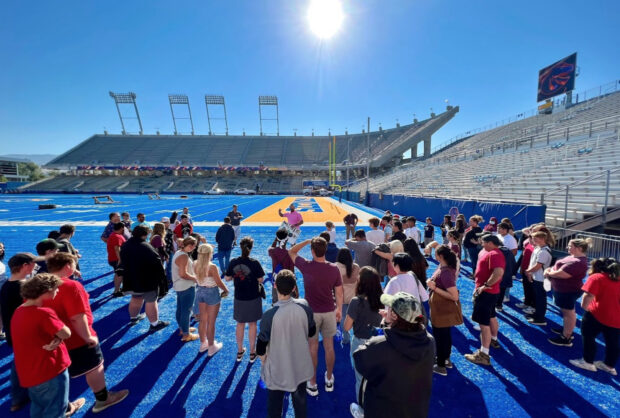In rural Payette, summer school is defying stereotypes and stigmas.
The program has been reframed as an opportunity to imagine and prepare for the possibilities of life after high school — as opposed to “remedial drudgery,” a consequence of failing one or more classes.
Renamed the “summer learning lab,” it’s replete with field trips, guest speakers and hands-on learning tailored to student interests.
And it’s not just the students who benefit. While they research and explore potential careers, their instructors — many of whom are teachers-in-training — get experience for theirs.
Now in its third year, the lab is a partnership between the Payette School District and Teach for America that’s aimed at reimagining summer school. It’s a symbiotic relationship of sorts, one that addresses teacher shortages and ensures vulnerable students benefit from low student-teacher ratios (think 5-to-1).
“It really becomes that rich, robust, individualized learning experience that’s often more difficult to come by in larger class sizes,” said Amanda Smith, Payette’s secondary summer school program administrator and the district’s curriculum and instruction director.

Since the partnership began in 2022, students are increasingly recovering class credits and “have more positive visions towards their future than when they came in,” Smith said.
Today’s learning for tomorrow’s future
This year, the learning lab kicked off its first week with a field trip to The College of Idaho and an afternoon spent golfing indoors. It’s an experience that “makes kids want to show up every day for school” and helps them feel “a sense of belonging,” said Tracy Sedano, the managing director of leadership development at Teach for America Idaho. The outing paid off by helping students and teachers begin building meaningful relationships, which quickly translated to decreased behavioral issues in the classroom.
The school days are structured with core classes in the morning, with project-based learning — centered on potential careers — in the afternoon. This year’s focus is on entrepreneurship, as guided by the question: “How does what I’m learning now impact the future I want for myself?”
“It’s all targeted on those real-life, real-world connections,” Smith said.
Some students are making their own mock food truck business, which includes planning menus, creating a business plan, and preparing loan applications. Others are designing and planning a mock drywall business.
Local business leaders, like owners of a local catering company, come in during the summer session and talk about their own journey and what it took to be successful. Students love the chance to interact and ask questions.
“It’s really inspiring to see those connections being built,” Smith said.
When the learning lab ends in mid-July, students will present their businesses and create a game of “Life” based on the future they envision for themselves, including anticipated obstacles and wins.
The goal is to improve students’ attitudes toward school and their futures, and train teachers who will support them on the way.
“All students are deserving of an excellent educational experience,” Sedano said. “And as teachers, we are responsible for delivering on that.”
The goal: ‘Equity for Idaho kids’
The Payette district serves a high-needs student population that generally underperforms statewide peers on standardized tests, and includes higher percentages of at-risk students than state averages.

Factors like housing insecurity or absenteeism can make it more difficult to stay on pace with peers, so at-risk students are often “more vulnerable for getting behind academically,” Sedano said. That’s where Payette’s learning lab comes in.
Teach for America aims to “work towards equity for Idaho kids” by ensuring they have access to qualified teachers and meaningful learning, Sedano said. The national program started its Idaho branch in the Treasure Valley in 2015, and has teachers in two dozen schools across nine districts and in a half dozen communities.
After participating in the lab, and learning from experienced mentor teachers, the TFA participants earn an initial certification and begin teaching. Over two years, they’ll become fully certified, and then have the option to stay on at their school or seek employment elsewhere.
Learn more about Teach for America Idaho here.
Disclosure: The J.A. and Kathryn Albertson Family Foundation, which funds Idaho Education News, also supports Teach for America.
